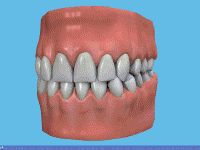
Periodontology is the science dealing with diagnosis and treatment methods about diseases of supportive structures (bones, gingival, cement, periodontal membrane) formed around tooth and tooth like tissues. Periodontology, also known as the treatment of gum diseases, is the science of the treatment of the diseases of the supporting tissues of the teeth (gum, jawbone, the tissues connecting the teeth to the jaw bone and adjacent tooth surface). Although the gum disease is a disease which affects the majority of our community; it is a disease whose causes, results and treatment are lesser known and which progresses insidiously.
Unless the gum disease (periodontitis), also colloquially known as pyorrhea is treated, inflammation resulting in tooth loss occurs.
Healthy gums are slightly rough like orange peel, have a smooth boundary line with teeth and a pink appearance. Healthy gums don’t bleed when you brush or eat.
Unless the teeth are cleaned properly, the food debris accumulated on and between them grows bacteria. These bacteria form a layer called plaque on the teeth. If plaque is not removed, it hardens and the substance called tartar or calculus is formed. The toxins (harmful substances) produced by the bacteria in the plaque irritate the gums. The toxins destroy supporting tissues around the teeth, pull away from the teeth forming pockets which then fill up with more plaque. As the gum disease progresses the pockets grow deeper. Plaque moves further down the roots of the teeth. The bone support of the teeth is damaged. The untreated teeth become loose and eventually fall out.
You can play an important role in the prevention of periodontal diseases. In order to keep your teeth in your mouth life-long, you should remove plaque from the teeth regularly every day with tooth-brushing, tooth-flossing or chemical agents.
In addition to the above, it is extremely important to go to the dentist for a check-up on a regular basis. Although daily oral cleaning will help keep calculus formation to a minimum, it cannot completely prevent it. A professional scaling removes the hardened calculus from the places you cannot clean with your toothbrush and floss. The removal of calculus is called scaling. Your dentist can provide an oral care plan based on your needs. With this plan, you can practice brushing and flossing your teeth without harming your teeth and gums.
You can get advice from your dentist about oral health products by visiting the dentist regularly. There are a variety of toothbrush, dental floss, mouthwash and tooth cleaner on the market. Your dentist will help you choose the most suitable products for you.
The treatment during the early stages of periodontal diseases is scaling and root planing. During these stages, bacterial remnants and calculus are removed from the pockets surrounding the teeth and tooth surfaces are smoothed. By these procedures, bacteria and toxic products causing infection are removed from the oral cavity. These procedures, which are applied during the early stages of periodontal diseases are generally enough to yield favorable results.
In more advanced cases, surgical intervention might be necessary. The purpose of surgical intervention is the removal of calculus and diseased tissues from deep pockets, root planing for the enhancement of healing and reshaping gingival tissues to enable an easier cleaning.